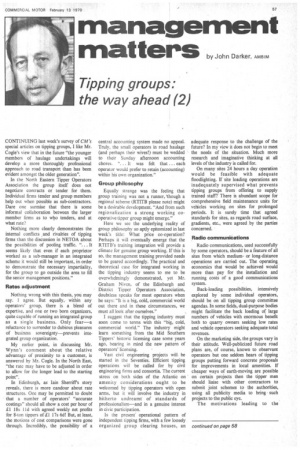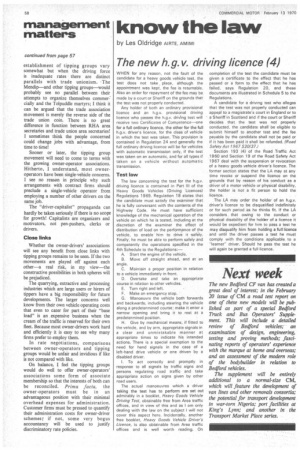management
Page 59

Page 60

If you've noticed an error in this article please click here to report it so we can fix it.
matters by John Darker, AMBIM
Tipping groups: the way ahead (2)
CONTINUING last week's survey of CM's special articles on tipping groups, I like Mr. Cogle's view that in the future "the younger members of haulage undertakings will develop a more thoroughly professional approach to road transport than has been evident amongst the older generation".
In the North Eastern Tipper Operators Association the group itself does •not negotiate contracts or tender for them. Individual firms tender and group members help out when possible as sub-contractors. Dare one surmise that there is some informal collaboration between the larger member firms as to who tenders, and at what rate?
Nothing more clearly demonstrates the internal conflicts and rivalries of tipping firms than the discussion in NETOA about the possibilities of pooling traffic. "... It seems likely that even if each proprietor worked as a sub-manager in an integrated scheme it would still be important, in order to demonstrate the necessary impartiality, for the group to go outside the area to fill the senior management positions."
Rates adjustment Nothing wrong with this thesis, you may say. I agree. But equally, within any operators' group, there is a blend of expertise, and one or two born organizers, quite capable of running an integrated group as a single business. Only fear—a reluctance to surrender to dubious pleasures of business sovereignty—prevents integrated group organization.
My earlier point, in discussing Mr. Wynn's comment about the relative advantage of proximity to a customer, is answered by Mr. Cogle. In the North East, "the rate may have to be adjusted in order to allow for the longer lead to the starting point".
In Edinburgh, as lain Sherriff's story reveals, there is more candour about rate structures. One may be permitted to doubt that a number of operators' "accurate costings" should all show a cost per hour of £1 18s I Id with agreed weekly net profits for 8-ton tippers of 1 17s 6d! But, at least, the motions of cost comparisons were gone through. Incredibly, the possibility of a central accounting system made no appeal. Truly, the small operators in road haulage (and perhaps their wives!) must be wedded to their Sunday afternoon accounting chores. "... It was felt that .. each operator would prefer to retain (accounting) within his own organization."
Group philosophy Equally strange was the feeling that group training was not a runner, 'though a regional scheme (RTITB please note) might be a desirable development. "And from such regionalization a strong working cooperative tipper group might emerge."
Here we see the underlying reality of group philosophy so aptly epitomized in last week's title: What price co-operation? Perhaps it will eventually emerge that the RTITB's training integration will provide a climate for genuine group working. If this is so, the management training provided needs to be geared accordingly. The practical and theoretical case for integrated working in the tipping industry seems to me to be overwhelmingly demonstrated, yet Mr. Graham Nivcn, of the Edinburgh and District Tipper Operators Association, doubtless speaks for most operators when he says: "It is a big, cold, commercial world out there and in these circumstances, we must all look after ourselves."
I suggest that the tipping industry must soon come to terms with this "big, cold, commercial world." The industry might learn something from the Mid Southern Tippers' historic licensing case some years ago, bearing in mind the new pattern of operators' licensing.
Vast civil engineering projects will be started in the Seventies. Efficient tipping operations will be called for by civil engineering firms and consortia. The current stress on both sides of the Atlantic on amenity considerations ought to be welcomed by tipping operators with open arms, but it will involve the industry in hitherto undreamt of standards of professionalism—and in a genuine interest in civic participation.
Is the present' operational pattern of independent tipping firms, with a few loosely organized group clearing houses, an adequate response to the challenge of the future? In my view it does not begin to meet the needs of the situation. Much more research and imaginative thinking at all levels of the industry is called for.
On many sites 24 hours a day operation would be feasible with adequate floodlighting. If site loading operations are inadequately supervised what prevents tipping groups from offering to supply trained staff? There is abundant scope for comprehensive field maintenance units for vehicles working on sites for prolonged periods. It is surely time that agreed standards for sites, as regards road surface, gradients, etc., were agreed by the parties concerned.
Radio communications Radio communications, used successfully by some operators, should be a feature of all sites from which mediumor long-distance operations are carried out. The operating economics that would be achieved would more than pay for the installation and running costs of a good communications system.
Back-loading possibilities, intensively explored by some individual operators, should be on all tipping group committee agendas. In some fields, dual-purpose bodies might facilitate the back loading of large numbers of vehicles with enormous benefit both to quarry owners seeking low rates and vehicle operators seeking adequate total revenues.
On the marketing side, the groups vary in their attitude. Well-publicized future road plans are, of course, known to observant operators but one seldom hears of tipping groups putting forward concrete proposals for improvements in local amenities. If cheaper ways of earth-moving are possible on certain projects then the tipper men should liaise with other contractors to submit joint schemes to the authorities, using all publicity media to bring such projects to the public eye.
The motivations leading to the establishment of tipping groups vary somewhat but when the driving force is inadequate rates there are distinct parallels with trade unionism. The Mendip—and other tipping groups—would probably see no parallel between their attempts to organize themselves commer: cially and the To!puddle martyrs; I think it can be argued that the trade association movement is merely the reverse side of the trade union coin. There is no great difference in function between RHA area secretaries and trade union area secretaries!
I sometimes think the people concerned could change jobs with advantage, from time to time!
Sooner or later, the tipping group movement will need to come to terms with the growing owner-operator associations. Hitherto, I understand, most owneroperators have been single-vehicle concerns.
I see no reason in principle why such arrangements with contract firms should preclude a single-vehicle operator from employing a number of other drivers on the same job.
The "driver-capitalist" propaganda can hardly be taken seriously if there is no scope for growth! Capitalists are organizers and motivators, not pen-pushers, clerks or drivers.
Close links Whether the owner-drivers' associations will see any benefit from close links with tipping groups remains to be seen. If the two movements are played off against each other a real risk, in my view—the constructive possibilities in both spheres will be prejudiced.
The quarrying, extractive and processing industries which are large users or hirers of tippers have a big responsibility for future developments. The larger concerns well know from their own vehicle operating costs that even to cater for part of their "base load" is an expensive business when the cream of the traffic is reserved for their own fleet. Because most owner-drivers work hard and efficiently it is easy to see why many firms prefer to employ them.
In rate negotiations, comparisons between owner-operators and tipping groups would be unfair and invidious if like is not compared with like.
On balance, I feel the tipping groups would do well to offer owner-operators' associations some form of associate membership so that the interests of both can be reconciled. Prima facia, the owner-operators must be in an advantageous position with their minimal overhead expenses for administration. Customer firms must be pressed to quantify their administration costs for owner-driver schemes; if not, some very bogus accountancy will be used to justify discriminatory rate policies.




































































